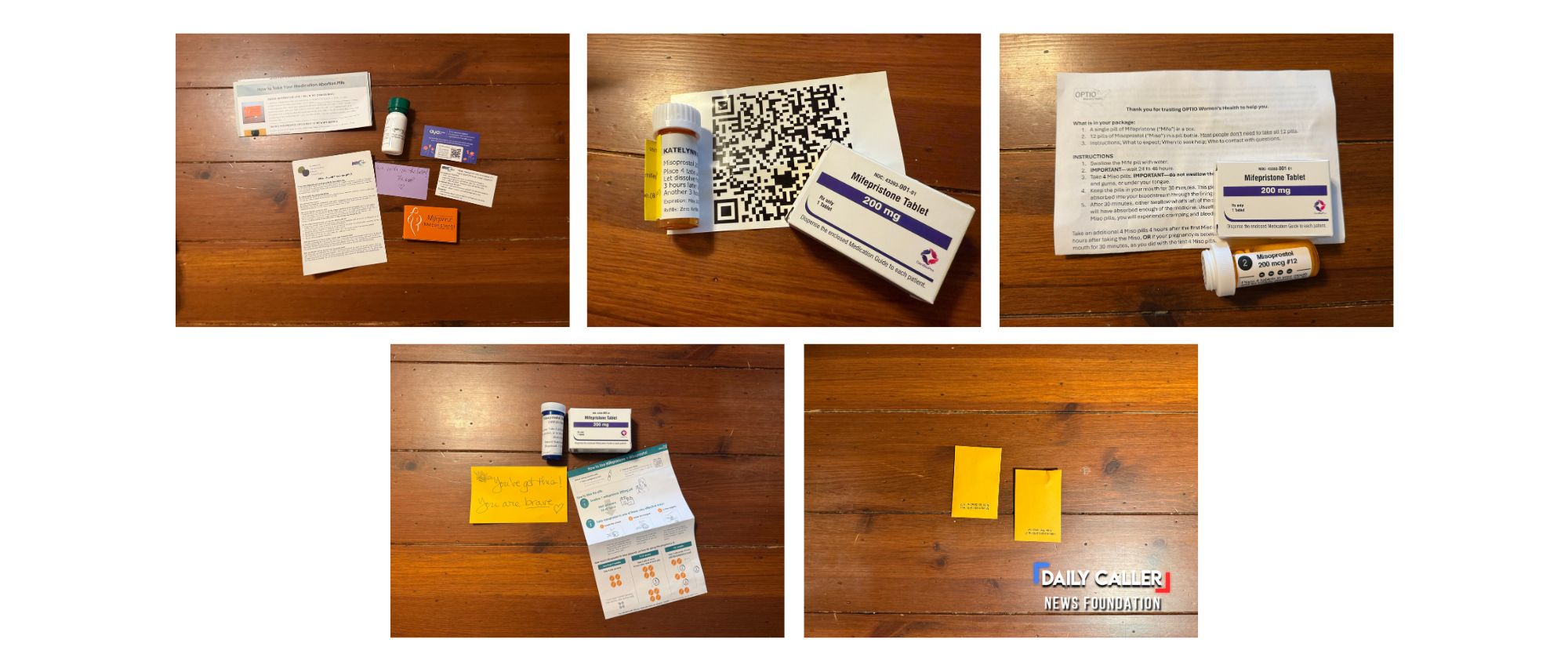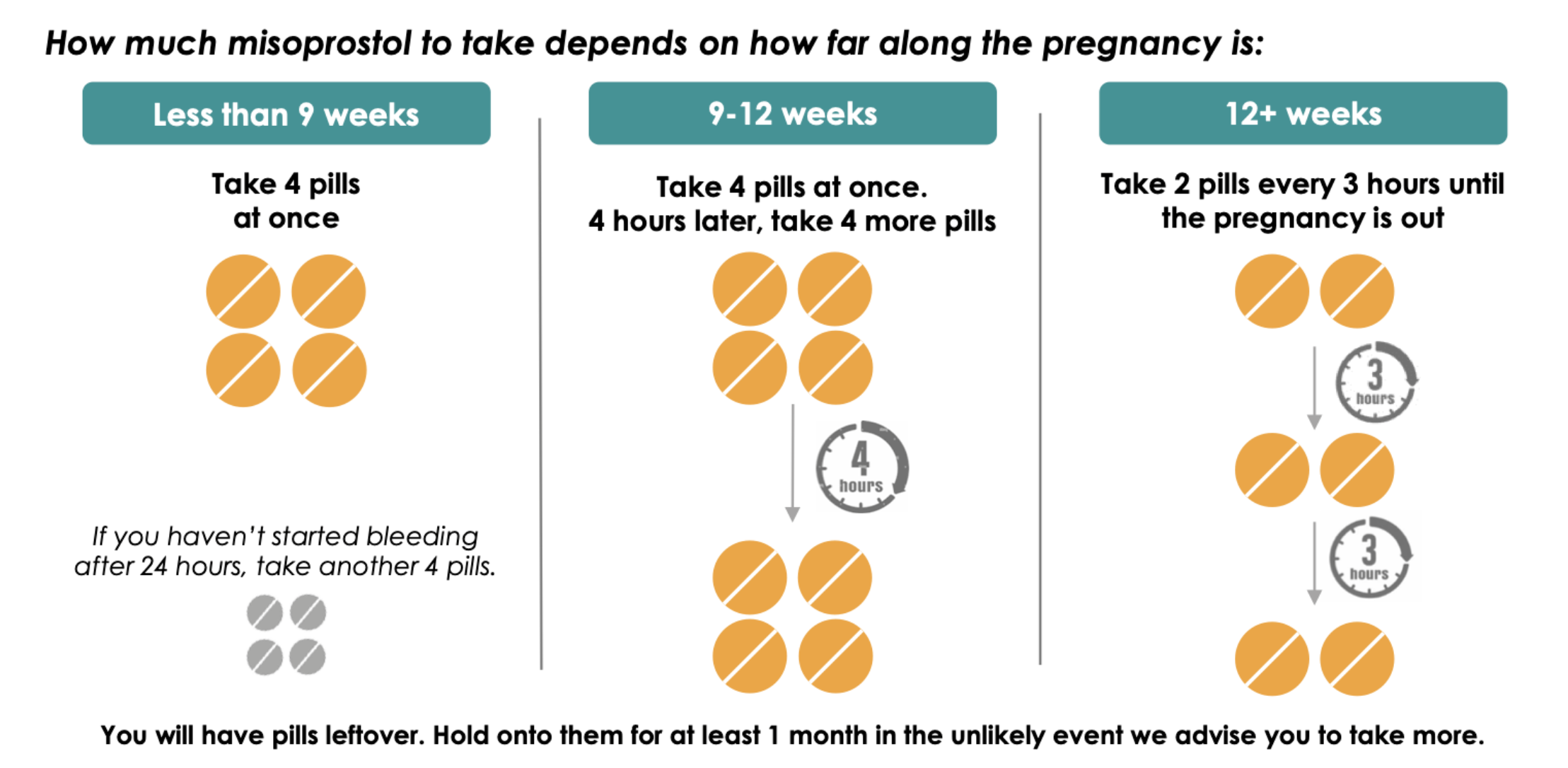In as little as five minutes, the Daily Caller News Foundation was able to easily order abortion pills opponents argue are unsafe without a doctor adequately verifying key eligibility requirements.
Groups that launched online services after the U.S. Food and Drug Administration (FDA) approved mail-order abortions will provide the pill under circumstances that are questionable even by the agency’s relaxed standards, a DCNF investigation found.
“Mail-order abortion subjects women to an abysmal standard of care,” Dr. Christina Francis, CEO of the American Association of Pro-Life OBGYNs (AAPLOG), told the DCNF. “Not only is there minimal health screening that occurs, but women typically have no interaction with any medical professional, let alone a physician.”
The FDA removed in 2021 a requirement that providers distribute mifepristone in person and enabled prescribers to send the pill directly to women in the mail. Now, without speaking to a physician or confirming a pregnancy, a woman can order prescription abortion pills to her home “just in case” she needs them in the future.
Minutes after filling out a brief online form, she’ll have her request approved. Days after payment, the pills will arrive on her doorstep. The package might include a handwritten note saying, “You are brave,” but no doctor will physically be there to warn her that mifepristone is not “safer than tylenol” as its advocates claim or that the danger of complications is likely higher than the drug’s label indicates.
The DCNF obtained five sets of medication for $660 — with sets ranging from $90 to $150 each — simply by filling out online medical forms created by providers.
WATCH:
Three of the five organizations that sent pills to the DCNF — Aid Access, OPTIO Women’s Health and Abuzz Health — use GenBioPro, one of two FDA-approved manufacturers of mifepristone. The fourth, Cambridge Reproductive Health Consultants (CRHC), supplies pills produced by Danco Laboratories, the other approved manufacturer.
The final group, Women on Web, sent pills in a plain manila envelope that did not indicate the drug’s producer. The mailing address on its website is in Toronto, Canada, though the return address on the package was listed as “Supplement City” in Kansas City, Kansas.
The owner of the Kansas property is Jose Franco Guevara, per public records, who owns multiple other buildings in the neighborhood. He faced a federal lawsuit in 2019 for not paying employees overtime compensation at one business he runs in the area, Sabor Latino Restaurant. Guevara agreed to a Consent Order paying the employees money owed to them.
Several other groups listed P.O. boxes as their return address. Aid Access’ package shipped from a California address linked to an individual who works for Honeybee Health, which was the first online pharmacy to begin shipping abortion pills by mail.
Aid Access, OPTIO Women’s Health, Abuzz Health, CRHC, Women on Web and Honeybee Health did not respond to requests for comment. GenBioPro and Danco Laboratories also did not respond to requests for comment.
‘Legal Gray Area’
Though the FDA prescriber agreement form requires being able to “assess the duration” of a pregnancy and “diagnose ectopic pregnancies,” the online pill distributors made no effort to do so.
Advanced provision is a “legal gray area” that exposes the root problem of the FDA’s relaxed regulations, Gabriella McIntyre, legal counsel for Alliance Defending Freedom’s Center for Life, told the DCNF.
“It’s not an FDA-approved use of abortion drugs,” McIntyre told the DCNF. “It’s difficult to see how you get recourse, at least from the FDA’s perspective, unless you reinstitute in-person dispensing, which would resolve the issue of practitioners being able to send these drugs in the mail without verifying things like gestational age or whether the woman is pregnant.”
McIntyre said she is not aware of any litigation related to doctors providing pills for future use.
Groups that supplied pills to the DCNF give instructions for taking the pill long after the 10 week period the FDA approved it for use.
“At 14 weeks, you might see a fetus about the size of a lemon,” Aid Access states. “Seeing a fetus after 14 weeks can be upsetting for some people. It is good to be prepared and have a plan for how to dispose of the fetal tissue.”
OPTIO Women’s Health similarly warns that a fetus at 12 weeks can be “about the size of a lime.” Abuzz indicates the pills can be used through 12+ weeks on its instructions, directing women to a FAQ page for more information, though the bottom of the page includes a caveat that “nothing on this website is to be construed as medical advice.”
“As an OB-GYN practicing in Texas, I have seen firsthand how these recommendations hurt women, because I have cared for many of them in the ER,” Dr. Ingrid Skop, vice president and director of medical affairs at the Charlotte Lozier Institute (CLI), told the DCNF. “Abortion drugs fail more frequently in higher gestational ages, so off-label use until 13 weeks may often require surgery to remove retained pregnancy tissue and/or the dead baby to prevent serious infection or hemorrhage.”
While the online medical forms these groups ask women to complete vary in length, each one took less than 5 minutes to fill out.
The groups asked only a few basic questions about preexisting health conditions and allergies to misoprostol or mifepristone, along with any history of a caesarean section or ectopic pregnancy. Several providers also asked about gender identity, sexual orientation and preferred pronouns. Only one of the five websites, Abuzz Health, asked for photo identification.
When the DCNF asked about cost assistance, Aid Access indicated they could not reduce the cost for pills in advance but would help in the future if pills were needed for a current pregnancy. Other groups share similar policies on their website, promising financial assistance to those in immediate need.
However, one group, Abuzz, did provide a discount from the full $150, allowing a minimum payment of $90 for pills in advance.
The quickest deliveries came in just three days. The longest order arrived after 7 days.
An FDA spokesperson did not say whether the specific groups that supplied pills to the DCNF violated their prescriber agreement but noted the Mifepristone Risk Evaluation and Mitigation Strategy (REMS) Program is “in place to ensure the safe use of this drug and sets forth specific requirements providers must meet before prescribing this drug, including the ability to date pregnancies accurately and the ability to diagnose ectopic pregnancies.”
Shield Law Practice
After Roe v. Wade was overturned in 2022, three doctors founded a group, the Abortion Coalition for Telemedicine, to promote laws that shield medical professionals in pro-abortion states from penalties for supplying abortion pills in states where it is banned. The organization provides instructions for doctors who want to become a “shield provider” supplying medication abortion in other states, including information on malpractice insurance and establishing an LLC.
One of the group’s co-founders, New York doctor Maggie Carpenter, is facing felony charges in Louisiana for supplying abortion pills to a mother who allegedly ordered them for her minor daughter. Democratic New York Gov. Kathy Hochul has said she would not comply with an extradition request to turn Carpenter over to Louisiana authorities.
A Texas court also ordered Carpenter to pay a $100,000 penalty in February for providing pills to residents of the state. Carpenter has worked with Aid Access since 2020, according to her archived bio.
The cases against Carpenter are the first efforts to hold doctors accountable for providing abortion pills across state lines. Several of the organizations that supplied mifepristone to the DCNF operate within states with shield laws.
CRHC operates The Massachusetts Medication Abortion Access Project (The MAP), which was developed after Massachusetts became the first state to pass a shield law in 2022 protecting doctors who serve patients in other states, where abortion may be illegal.
The CRHC is run by professors primarily from Canada, though one consultant on the team, Dr. Kathryn LaRoche, is an assistant professor of Public Health at Purdue University. CRHC’s website explains that it uses “doctors in Massachusetts to prescribe FDA-approved abortion medication to patients who apply through our website.”
Dr. Angel Foster, one of The MAP’s co-founders, wrote in a March letter to Connecticut state Sen. Gary Winfield that the organization is now supplying medication abortion “to about 2,500 patients a month,” with 95% of patients residing in states with abortion bans.
“[W]e need more states with comprehensive Shield Laws and we need more telemedicine Shield Law providers willing to offer care in all 50 states,” she wrote. “The more providers we have the more we will be able to normalize Shield Law provision and support each other.”
A Safe Choice Network, which partners with OPTIO Women’s Health, indicates on its website that all doctors in the network are licensed to practice in California, which passed a shield law in 2023.
Aid Access’ organization operated abortion “Roe-bots” — robots that dispense the abortion pill — outside the Supreme Court when it heard the case challenging mifepristone in 2024, operating them “remotely from within shield law states.”
Twenty-two states, along with Washington, D.C., now have some form of abortion-related shield laws in place, according to UCLA Law.
‘This Is Not Healthcare’
Nearly 83.5% of abortion-related ER visits that result from taking mifepristone were incorrectly coded as miscarriages between 2016 and 2021, according to a study of Medicaid data by CLI. These miscoded visits were more likely to be severe than those correctly coded.
“These miscoded abortion complications remain invisible to research scientists resulting in a large underestimation of actual medical abortion complications,” the study found.
Skop noted abortion providers who tell women not to disclose they took the abortion pill both reflect “a disregard for women’s well-being” and exacerbate “the already poor-quality abortion data collection in the U.S., further obscuring the frequency of complications from women and the public.”
One in ten women who take the abortion pill will experience a “serious adverse event,” according to an April study of insurance data by the Ethics and Public Policy Center (EPPC), which is higher than the “less than 0.5 percent” of patients listed on the drug label.
“Across the country, we’ve seen the horrific results of these practices,” Francis told the DCNF. “A teenage girl required emergency care for complications of the abortion drugs after being forced to take them by her mother who obtained them online. Women have died alone at home after attempting to undergo this process without medical supervision. This is not healthcare. It’s negligence.”
Yet statistics published by the groups, as well as anecdotes, confirm women are ordering the pills for future use in record numbers. Some women began stocking up after Trump won the 2024 election.
“I bought 2 rounds of the pills from Women on the web as soon as trump won,” one woman wrote on Reddit. “I have them because we don’t want kids, and I’m afraid we may loose [sic] access in a red state. So it’s well worth having, 2 Year shelf life. Would recommend to anyone who wants to protect their right to abortion access.”
Aid Access received over 5,000 requests for pills in the 12 hours after Trump’s victory was announced, according to The Guardian.
“We’ve never seen this before,” co-founder Rebecca Gomperts told the outlet.
All content created by the Daily Caller News Foundation, an independent and nonpartisan newswire service, is available without charge to any legitimate news publisher that can provide a large audience. All republished articles must include our logo, our reporter’s byline and their DCNF affiliation. For any questions about our guidelines or partnering with us, please contact licensing@dailycallernewsfoundation.org.




![Former Bravo Star Charged After Violent Assault Using a Rock-Filled Sock in Tennessee Walmart [WATCH]](https://www.right2024.com/wp-content/uploads/2025/07/Former-Bravo-Star-Charged-After-Violent-Assault-Using-a-Rock-Filled-350x250.jpg)







![Karoline Leavitt Levels CNN's Kaitlan Collins and Other Legacy Media Reporters [WATCH]](https://www.right2024.com/wp-content/uploads/2025/07/Karoline-Leavitt-Levels-CNNs-Kaitlan-Collins-and-Other-Legacy-Media-350x250.jpg)
![Man Arrested After Screaming at Senators During Big Beautiful Bill Debate [WATCH]](https://www.right2024.com/wp-content/uploads/2025/06/Man-Arrested-After-Screaming-at-Senators-During-Big-Beautiful-Bill-350x250.jpg)




